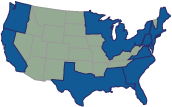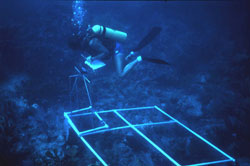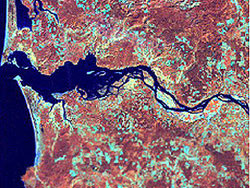You are here: Home › About Us › Research Strategy
Research Strategy

CSCOR has developed operating principles that guide project design and management to ensure the development of the highest quality science directed to issues of importance to NOAA, Congress, and coastal managers. These operating principles revolve around competitive research, ecosystem focus, national priorities, effective partnerships, prediction endpoint, operational transfer, and research translation. Each CSCOR program strives to incorporate these principles to the fullest extent possible.
Competitive research: CSCOR applies a rigorous, competitive, peer-review process to select research projects. Federal and academic scientists compete on an equal footing for CSCOR support, and collaborative programs between Federal and academic researchers are encouraged. The review process is extensive and documented, to make it as transparent as possible to applicants. Most programs utilize both mail reviews, to provide comments on individual proposals, and panel reviews, to look at the suite of proposals. Both Federal and academic scientists are used in the review process. CSCOR assures that this quest for quality science carriers through the entire project from concept to final products by including peer-review at all critical levels, seeking the advice of external experts, and initiating regular reviews of the programs. Through this rigorous process, involving both Federal and academic researchers, CSCOR is able to combine the best science in NOAA with the best in the research community (including universities, non-profit laboratories, and institutions) to address important coastal issues. CSCOR’s ability to attract both Federal and academic scientists, and promote an applied, ecosystem-scale focus is not possible through other agencies or organizations.
Ecosystem focus:  CSCOR typically
supports regional-scale projects with an ecosystem focus. Funding of
these projects is commensurate with the fairly large-scale, multi-disciplinary
nature of the problems they address. Most projects are long in duration
and are designed with a specific funding cycle and endpoint, with periodic
reviews in mid-life of the project. This allows CSCOR to
devote sufficient time and resources to tackle large-scale issues,
but still be flexible enough to devote funding to address emerging
topics. Through these ecosystem studies, CSCOR is
able to address key research questions and develop critically needed
tools for management decisions not possible with short-duration, small-scale
studies (e.g., multi-species fisheries models, classifying organism-environment
interactions, identification and separation of human-induced ecosystem
changes from those produced by natural variability, understanding impacts
of multiple stressors, and determining economic costs of management
scenarios). CSCOR strongly
believes these regional ecosystem level studies are the appropriate
approaches for undertaking a science-policy interface where practical
strategies for handling management problems can be developed and implemented.
CSCOR typically
supports regional-scale projects with an ecosystem focus. Funding of
these projects is commensurate with the fairly large-scale, multi-disciplinary
nature of the problems they address. Most projects are long in duration
and are designed with a specific funding cycle and endpoint, with periodic
reviews in mid-life of the project. This allows CSCOR to
devote sufficient time and resources to tackle large-scale issues,
but still be flexible enough to devote funding to address emerging
topics. Through these ecosystem studies, CSCOR is
able to address key research questions and develop critically needed
tools for management decisions not possible with short-duration, small-scale
studies (e.g., multi-species fisheries models, classifying organism-environment
interactions, identification and separation of human-induced ecosystem
changes from those produced by natural variability, understanding impacts
of multiple stressors, and determining economic costs of management
scenarios). CSCOR strongly
believes these regional ecosystem level studies are the appropriate
approaches for undertaking a science-policy interface where practical
strategies for handling management problems can be developed and implemented.
National Priorities: Research priorities are often national in scope, crossing local and state jurisdictional boundaries. CSCOR seeks input from Federal, state, and local management entities, as well as external researchers, in developing new programs. CSCOR also holds workshops to identify key issues affecting stakeholders in a particular region or ecosystem. CSCOR is often mandated by Congress to address specific issues or regions, including harmful algal blooms, hypoxia, South Florida restoration, and coral reef health. Since the re-organization of Coastal Ocean Program (COP) into the NOAA Ocean Service, its programs have sought to address more directly the needs of the NCCOS and NOAA Ocean Service and their stakeholders, especially with respect to resources protected by NOAA. Through these efforts, CSCOR supports the mission and goals of NCCOS and NOAA by rapidly pursuing emerging coastal ocean issues, while actively engaging the academic community.
Effective Partnerships: For coastal ocean science to respond to the Nation’s growing coastal problems, research must go beyond piecemeal approaches and local perspectives. CSCOR takes a leadership role in developing projects in cooperation with other offices, agencies, and organizations in order to respond to the national priorities identified for coastal systems. An interagency commitment ensures multi-disciplinary approaches to many coastal problems, through the unique goals and missions of each agency. CSCOR jointly sponsors projects with a number of Federal agencies including the National Science Foundation, U.S. Environmental Protection Agency, U.S. Department of Defense-Office of Naval Research, and National Aeronautics and Space Administration. CSCOR partners with other parts of NOAA and the NCCOS centers as well, including the National Sea Grant College Program, NOAA Fisheries Service Science Centers, and NOAA Ocean Service-Coast Survey Development Laboratory. CSCOR also maintains partnerships with approximately 126 universities and other research institutions through over 110 extramural research projects. These efforts ensure that CSCOR’s limited funds are spent in an efficient manner through the leveraging of resources with other interested partners.
Prediction endpoint: Prediction is an important component of CSCOR-sponsored research, and the delivery of that predictive capability into the hands of stakeholders is the desired endpoint. Projects designed to improve predictive capabilities provide long-term solutions rather than single issue-driven, short-term adjustments. To arrive at the appropriate prediction endpoint, all of the essential elements of a comprehensive science plan must be included. These include providing an appropriate balance between time series observations, process research, model development, synthesis and assessment, and information transfer. Then, the cost and benefits of each strategy and the potential social and economic outcomes can be used to create useful management strategies. CSCOR strives for the involvement of coastal managers in project development and, in some cases, project management to help identify knowledge gaps. For many coastal issues, decision making is reactive to perceived threats and stressors, and significant time can elapse between the perception of a threat and the development of an effective management strategy. With an improved capability to predict how coastal ecosystems will change under certain scenarios, management can become proactive in facing the problems confronting the coastal ocean.
Operational transfer:  NOAA,
as a mission agency, expects models and tools generated in basic research
projects to become the foundation for 'operational' forecasting capabilities
for identifiable user communities (i.e., stakeholders) in a region. Without
a dedicated effort to facilitate the transfer of successful research products
to managers, these products often never make it beyond the research phase.
CSCOR is thus committed to the development of science programs that can be made
useful to coastal management. Many CSCOR projects generate prototype programs
and products such as models that may become operational after CSCOR-funded
design and testing phases have been completed. For instance, several CSCOR
projects have been successfully transferred to other NOAA offices for implementation
(e.g., CoastWatch, Coastal-Change Analysis Program, Great Lakes Coastal Forecast
System) and several more are currently in development. In most cases, CSCOR
has cooperated with another NOAA office during prototype development and arranges
for the completed program or product to be transferred to that office for implementation.
The operational transfer of successful research products is a key goal of CSCOR
and through these efforts, CSCOR is able to maintain the funding flexibility
to tackle emerging coastal environmental issues.
NOAA,
as a mission agency, expects models and tools generated in basic research
projects to become the foundation for 'operational' forecasting capabilities
for identifiable user communities (i.e., stakeholders) in a region. Without
a dedicated effort to facilitate the transfer of successful research products
to managers, these products often never make it beyond the research phase.
CSCOR is thus committed to the development of science programs that can be made
useful to coastal management. Many CSCOR projects generate prototype programs
and products such as models that may become operational after CSCOR-funded
design and testing phases have been completed. For instance, several CSCOR
projects have been successfully transferred to other NOAA offices for implementation
(e.g., CoastWatch, Coastal-Change Analysis Program, Great Lakes Coastal Forecast
System) and several more are currently in development. In most cases, CSCOR
has cooperated with another NOAA office during prototype development and arranges
for the completed program or product to be transferred to that office for implementation.
The operational transfer of successful research products is a key goal of CSCOR
and through these efforts, CSCOR is able to maintain the funding flexibility
to tackle emerging coastal environmental issues.
Results Translation: CSCOR is committed to delivering the highest quality science in time for important coastal policy decisions. To accomplish this, scientific results must be translated into useful information for stakeholders. CSCOR accomplishes this through several mechanisms depending on the audience for the research results and products. One very successful method has been through the CSCOR Decision Analysis Series, a series of technical papers designed to disseminate scientific results to the management community and synthesize information on key research and management priorities. The Decision Analysis Series uses the competitive peer-review process to identify and respond to the specific needs of coastal managers and has been used to address such issues as management of cumulative coastal environmental impacts, the potential impacts of climate change on coastal and marine resources, marine eutrophication, and habitat restoration. A six-report Decision Analysis Series on the "Integrated Assessment on Hypoxia in the Northern Gulf of Mexico" was a comprehensive synthesis of existing research on this pressing problem and was used to support an action plan for reducing, mitigating, and controlling hypoxia in the Gulf of Mexico. Other translation efforts include special sessions at conferences, dedicated journal editions, workshops, and CSCOR programs dedicated to studies bridging science and policy, as well as efforts to facilitate and/or enhance the development of qualified professionals in the fields of coastal ocean science, management, and policy.

